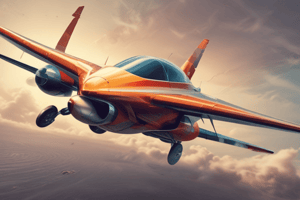Podcast
Questions and Answers
What is aerodynamics?
What is aerodynamics?
The way objects move through air.
Which of the following are considered the four forces of flight? (Select all that apply)
Which of the following are considered the four forces of flight? (Select all that apply)
- Weight (correct)
- Thrust (correct)
- Lift (correct)
- Drag (correct)
What type of drag increases with the square of airspeed?
What type of drag increases with the square of airspeed?
- Skin friction drag
- Form drag
- Parasite drag (correct)
- Induced drag
What is form drag?
What is form drag?
What is the purpose of polishing an aircraft's surface?
What is the purpose of polishing an aircraft's surface?
What causes interference drag?
What causes interference drag?
What is induced drag and when is it most significant?
What is induced drag and when is it most significant?
Who formulated Newton's Laws of Motion?
Who formulated Newton's Laws of Motion?
Newton's Laws of Motion are not relevant in engineering.
Newton's Laws of Motion are not relevant in engineering.
What does Newton's 1st Law of Motion state?
What does Newton's 1st Law of Motion state?
Flashcards are hidden until you start studying
Study Notes
Aerodynamics
- Aerodynamics is the science of how objects move through air
- The principles of aerodynamics explain how aircraft fly
- Anything that moves through air is affected by aerodynamics, from rockets to kites to cars
Forces of Flight
- Four main forces act on an aircraft: lift, weight, thrust, and drag
- Lift is the upward force that opposes the aircraft's weight, generated mainly by the wings
- Weight is the downward force due to gravity acting on the aircraft's mass
- Thrust is the forward force produced by the engines, propelling the aircraft
- Drag is the resistance force that opposes thrust, caused by air friction as the aircraft moves
Drag
- Drag is an aerodynamic force that opposes aircraft motion through the air
- Drag slows the aircraft down or requires more thrust to maintain speed
- Two main types of drag: parasite drag and induced drag
Parasite Drag
- Parasite drag is the resistance created by the movement of the aircraft through air
- Form Drag is caused by an object's shape: blunt objects have higher form drag than streamlined shapes
- Skin Friction Drag is due to friction between the aircraft's surface and flowing air particles
- Interference Drag arises from interactions between airflow around different parts of the aircraft, causing turbulence
Induced Drag
- Induced drag is a byproduct of lift
- Induced drag is caused by high-pressure air from below the wing spilling over to the low-pressure area above, forming wingtip vortices
- These vortices disrupt airflow and create drag
- Induced drag is most significant at low speeds and decreases as airspeed increases
Newton's Laws of Motion
- Newton's Laws of Motion describe the relationship between an object's motion and the forces acting on it
- These laws provide a fundamental framework for understanding object behavior, whether at rest or in motion
Isaac Newton
- Sir Isaac Newton was an English mathematician, physicist, and astronomer
- He developed the laws of motion and the theory of universal gravitation
- Newton's book Philosophiæ Naturalis Principia Mathematica (1687) introduced the three Laws of Motion, critical to classical mechanics
Newton's First Law of Motion
- The Law of Inertia states that an object at rest remains at rest, and an object in motion remains in motion at a constant velocity, unless acted upon by a net force
Studying That Suits You
Use AI to generate personalized quizzes and flashcards to suit your learning preferences.




